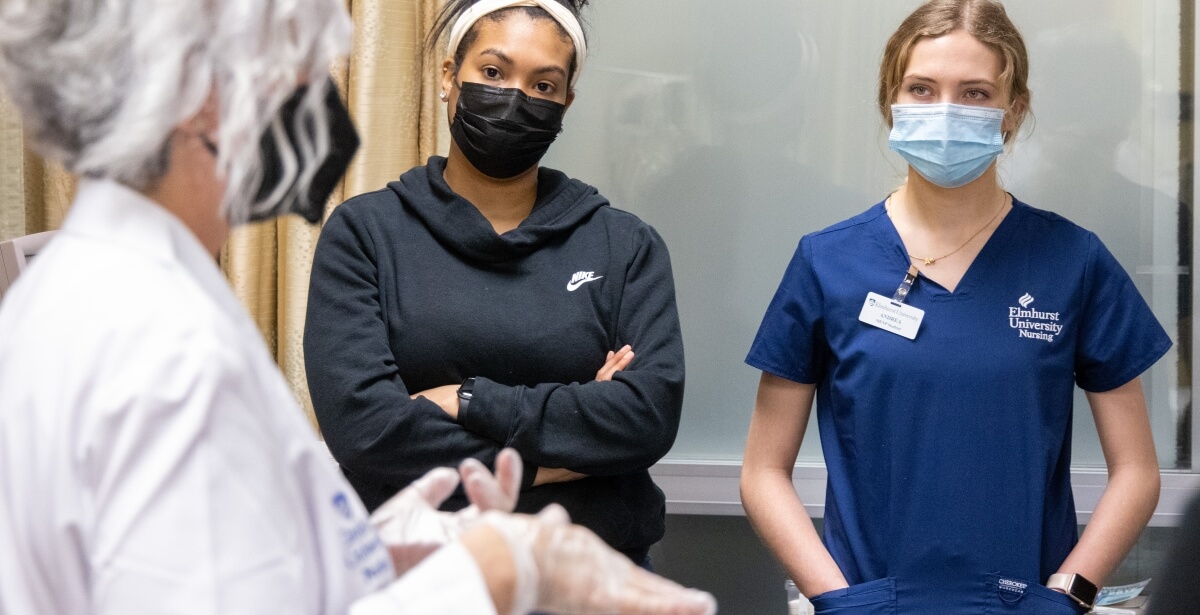9 Jobs for Nurses Outside the Hospital

There are countless jobs for nurses outside the hospital setting. Some involve direct patient care, while others are more administrative, educational or research-focused. Nurses can find fulfilling roles that extend far beyond bedside care.
Whether the goal is to work in a different setting or to transition into a nonclinical leadership or education role, nurses have abundant opportunities. Prospective registered nurses (RNs) can pursue an advanced education, such as a master’s degree, to gain relevant skills and experience for nonhospital roles.
Statistics for Nonhospital RN Jobs
The statistics show that there are plenty of nonhospital jobs for nurses. In 2024, there were approximately 3.4 million registered nursing jobs in the United States. According to the U. S. Bureau of Labor Statistics, 59% of registered nurses are employed in hospital settings, meaning that approximately 41% of RNs are employed in nursing jobs that are not in hospital settings.
The Occupational Outlook Handbook further breaks down these statistics to detail the number of registered nurses employed in other common practice types. The percentage of registered nurses working in these nonhospital RN jobs is as follows:
- 19% of registered nurses are employed in ambulatory care settings
- 6% of registered nurses are employed in nursing homes and facilities providing residential care
- 5% of registered nurses are employed within the government sector of health care
- 3% of registered nurses are employed in educational settings
Work setting is important to consider when deciding on a career pathway. Finding an employment option that fits well with your personality and life goals can be fulfilling.
For example, you may be a person who works best with minimal supervision and in relatively quiet environments. Alternatively, you may be interested in a fast-paced position with plenty of human interaction. Both types of employment options exist for nurses, and many others, each with unique characteristics.
Opportunities for Second-Career Nurses
There are many opportunities for those with a second degree in nursing who want to work in nonhospital RN jobs. If you hold a bachelor’s degree in another field besides nursing and are considering a change, a Bachelor of Science in Nursing (BSN) or Master’s Entry in Nursing Practice (MENP) program will allow you to become an RN.
Some nursing employment opportunities are open to qualified applicants with a BSN, while additional options may become available with a graduate-level education. Teaching, for example, is one occupation that requires a master’s or doctoral degree. Here are a few roles you can get with a master’s degree in nursing.

9 Non-Hospital Jobs for Nurses
For nurses who love the profession but are ready to try a setting beyond hospital walls, a world of opportunity awaits. From clinics and schools to corporate wellness programs and government agencies, nurses can find fulfilling roles that match their passions and lifestyle.
The following are some of the most rewarding jobs for nurses outside the hospital—each offering unique ways to make a difference while applying clinical expertise in new environments.
1. School Nurse
School nurses have various responsibilities, including conducting health assessments, triage of acute illness, administration of medications, maintaining compliance records, completing health screenings and providing health promotion and health education activities. School nurse positions serve students from prekindergarten to seniors in high school. There are also opportunities within colleges and universities for nurses to work in student health locations.
2. Palliative Care Nurse
Palliative care nurses provide compassionate, holistic support to patients living with serious or terminal illnesses. They focus on improving quality of life by managing pain, easing symptoms and offering emotional support to both patients and their families.
Working closely with interdisciplinary teams that include physicians, social workers, chaplains and therapists, palliative care nurses help coordinate individualized care plans that address physical comfort and emotional well-being.
These nurses may work in patients’ homes, nursing facilities or dedicated hospice centers. Beyond clinical expertise, they bring empathy, communication skills and emotional resilience to their work—helping patients navigate end-of-life journeys with dignity and compassion.
3. Ambulatory Care Nurse
Doctor’s offices and primary care clinics employ the second largest number of nurses after hospitals. Ambulatory care nurses assist in preparing and assessing patients for outpatient care. There are opportunities to choose a nursing specialty within this practice location, as ambulatory care nurses can work in orthopedic surgery centers, cardiology offices, pediatric offices and other outpatient specialty care clinics.
4. Registered Nurse Health Coach
Health coaching expands on the techniques of motivational interviewing learned in nursing school and offers an opportunity for registered nurses to help clients set and reach health-related goals. While not all health coaches are registered nurses, the added nursing credentials allow RN health coaches to provide a higher level of expertise coupled with patient education and advocacy.
Becoming an RN health coach can be an excellent choice if you are passionate about health and wellness. The Board of Medical Examiners has partnered with the National Board of Health and Wellness Coaches to offer a complete board certification examination and credential for health and wellness coaches.
5. Informatics Nurse
The applications of technology in health care continue to evolve and grow. Informatics nurses combine RN training with an understanding of information technology to help generate meaningful, usable processes for tracking and documenting health-related content. Certification and continuing education classes are available for nurses interested in specializing in nursing informatics.
Informatics nurses can help students and faculty electronically enter health records, clinical notes, evaluations and myriad other data pieces. They not only aid in training end users of technology systems but also play an essential role in helping organizations and agencies maintain databases showing compliance with rules and regulations for quality care and education.
While some informatics nurses work in hospitals, they are also employed in nonhospital settings, including academic institutions. Informatics is a specialized field including the design and deployment of technology systems that manage the storage and flow of information throughout health care. Many informatics positions require a master’s degree.
6. Legal Nurse Consultant
Some nurses work on legal cases requiring research and documentation related to medical or health conditions. Legal nurse consultants use their nursing knowledge and practice experience to help make recommendations that can inform the outcomes of legal proceedings or insurance claims.
A closely related occupation to a legal nurse consultant is a forensic nurse examiner. Forensic nurse examiners may also inform courts and legal matters by collecting health-related information from crime scenes. Forensic nursing often requires certification and a master’s degree.
Both of these nonhospital nursing roles allow nurses the potential to be strong advocates for patients with mental illness, survivors of violent crimes and other vulnerable populations.
7. Public Health Nurse
Many nursing jobs focus on the health of individuals and families, perhaps focusing on specific populations such as the military, those in correctional facilities or rehabilitation.
Public health is distinct in that it focuses on the health of communities as a whole. Those passionate about visualizing, developing and implementing programs to address health disparities and improve our nation's health are excellent candidates for public health nursing. Nonprofit organizations and community centers are just two of the many locations where public health nurses may be employed.
8. Utilization Review Nurse
Utilization review nurses play a vital role in evaluating the medical necessity, efficiency and appropriateness of health care services. They review patient records, treatment plans and insurance claims to ensure that care meets established guidelines and coverage criteria. Working for insurance companies, hospitals or managed care organizations, these nurses serve as a bridge between clinical teams and payers—helping balance quality patient care with cost-effective resource management.
Strong analytical skills, attention to detail, as well as a solid understanding of medical coding, clinical standards and health care regulations are essential for success in this role.
9. Health Educator
Health educators help individuals and communities improve their overall health and well-being through education, behavior change and lifestyle guidance. They design and deliver programs focused on nutrition, fitness, stress management and disease prevention, empowering clients to make sustainable health choices.
Often working in corporate wellness programs, community health organizations or private practice, they assess client needs, set achievable goals and track progress over time. Success in this role requires strong communication and motivational skills, along with a solid understanding of public health principles and evidence-based wellness strategies.
Nursing as a Second Career
The transition to a nursing career typically involves completing an accelerated Bachelor of Science in Nursing (ABSN) program based on general education credits earned in a previous bachelor’s program as the starting point for attaining a bachelor’s degree in nursing.
However, if you are interested in pursuing some of these jobs for nurses outside the hospital, leadership skills and continued focus on quality care improvement can be further honed in graduate education programs. To earn a graduate-level degree, consider enrolling in a Master’s Entry in Nursing Practice (MENP) program. Selecting a quality nursing program from the available options can be a difficult choice. Here are some tips for choosing the right nursing program for you.
An initial nursing education program is foundational to making nursing a second career. An ABSN or MENP program is a focused program of study that includes clinical hours and prepares graduates to take and pass the NCLEX practice exam. This examination is required to become a licensed RN. Read more here for five reasons to pursue nursing as a second career.

Consider Elmhurst University for Your MENP Program
Elmhurst University offers an Online Master’s Entry in Nursing Program for those looking to change to nursing as a second career. This unique program has been designed specifically for those with a bachelor’s degree in another field looking to become registered nurses.
Graduates of the Elmhurst University MENP program earn a Master of Science in Nursing (MSN) degree and the qualifications required to enter a new role caring for patients and communities. The program prepares you to sit for the NCLEX-RN examination and Clinical Nurse Leader (CNL) certification. For more information on how you can complete your Direct-Entry MSN with Elmhurst University, visit the program page for more details.

